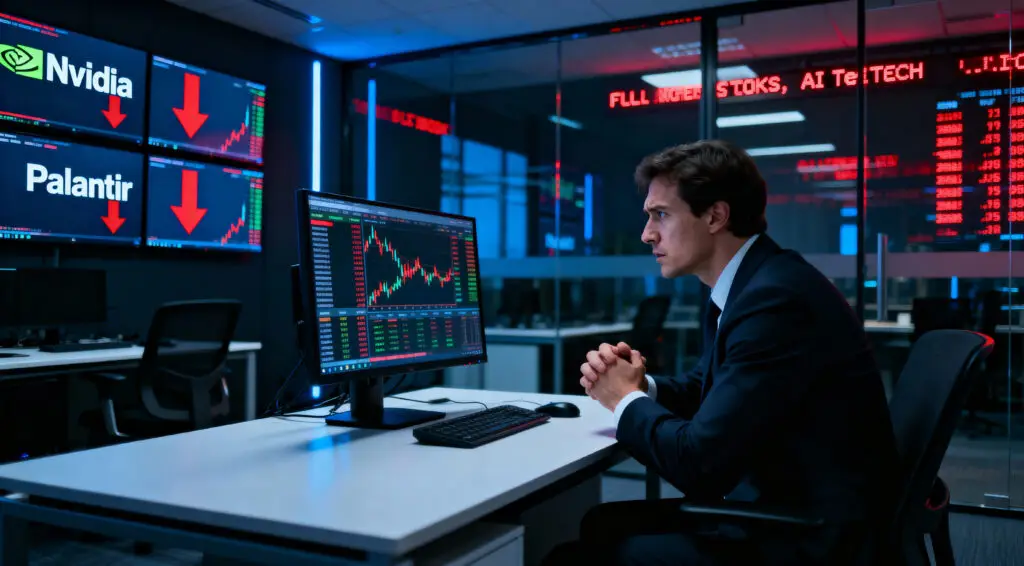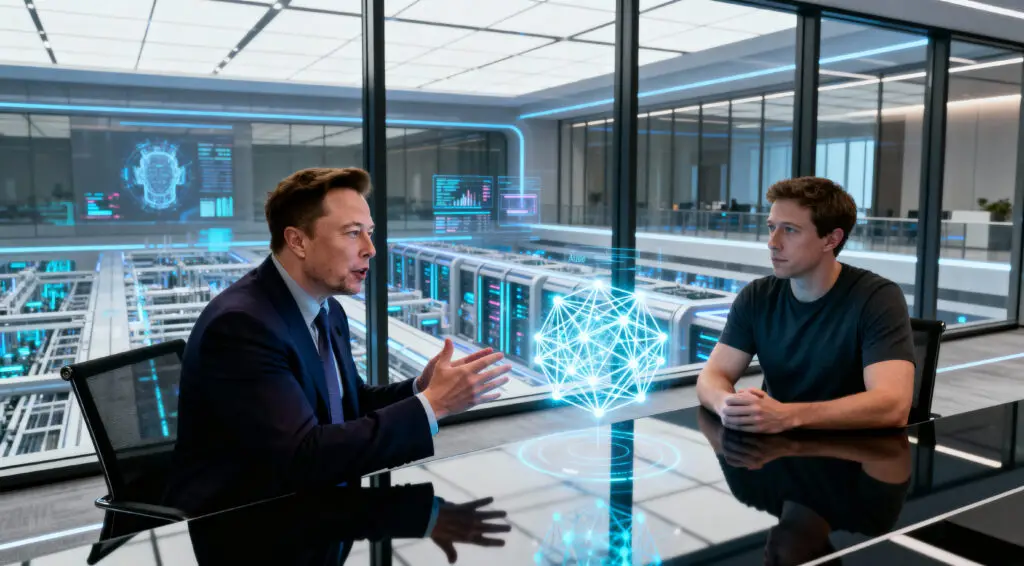Big Short Trader Michael Burry Warns of AI Bubble as Tech Stocks Drop
NEW YORK — November 6, 2025 — Hedge-fund manager Michael Burry, the investor who inspired The Big Short, has reignited debate over the stability of the artificial-intelligence sector after revealing a major short position against AI-related stocks Nvidia and Palantir. The announcement coincides with a broad market sell-off that has hit technology shares worldwide.
Market Tremors as AI Valuations Come Under Pressure
Shares of leading technology companies fell sharply this week amid growing concerns that AI valuations may be outpacing their fundamentals. Nvidia, recently valued at over $5 trillion, slipped nearly 4% on Wednesday as investors reacted to reports that Burry’s firm had taken a $1.1 billion bet against AI stocks.
Other companies linked to the sector also fell, with Palantir declining in late-day trading and Amazon shedding nearly 2% despite its recent $38 billion partnership with OpenAI. Analysts described the drop as a “wake-up call” for investors who have treated AI as a guaranteed growth story.
Burry’s Move Revives Memories of the 2008 Crisis
Burry, whose accurate prediction of the U.S. housing collapse was immortalized in the 2015 film The Big Short, has once again challenged market consensus. His firm disclosed the purchase of options that would profit if Nvidia and Palantir shares fall further.
“Sometimes we see bubbles,” Burry posted on X (formerly Twitter). “Sometimes the only winning move is not to play.” The cryptic message sparked immediate speculation that he was drawing parallels between today’s AI mania and the dot-com boom of the late 1990s.
Recommended Article: Lovable Surges to $5B Valuation With $100M Annual Revenue
Asian Markets Echo the Shockwave
The fallout from Burry’s bets extended across Asia. Japan’s Nikkei 225 index tumbled 2.5%, dragged down by tech-investment giant SoftBank, whose shares plunged more than 10%. Analysts said SoftBank’s exposure to AI-driven firms amplified the reaction.
In South Korea, Samsung Electronics lost over 4%, while Taiwan’s TSMC — a key chip supplier for Nvidia — dropped 3%. Regional indexes from Seoul to Taipei closed lower, underscoring the global reach of AI-sector volatility.
Analysts Warn of Investor Fatigue
Financial experts believe Burry’s move highlights a broader sentiment shift. “Investors are questioning whether these sky-high valuations reflect sustainable earnings or just speculative hype,” said Farhan Badami, market analyst at eToro. “AI spending is soaring, but profitability for many firms remains uncertain.”
He added that investor enthusiasm has fueled rapid price increases over the past year, often outpacing revenue growth. “Fatigue is inevitable when valuations diverge too far from fundamentals,” Badami said. “Burry’s warning is forcing markets to re-evaluate their risk.”
A Speculative Cycle Re-Emerging
Experts have drawn comparisons between the current AI boom and past tech bubbles. “The AI sector has absorbed trillions in market capital in record time,” noted Vincent Fernando, investment consultant at Zero One Advisory. “Every cycle creates its own narrative of inevitability, and this time it’s ‘AI will change everything.’ That may be true long-term, but short-term returns are already overstretched.”
Fernando explained that companies with strong AI branding but limited earnings are particularly vulnerable. “When expectations outrun execution, market corrections follow,” he said. “Burry’s bet is a signal to slow down and reassess where the real value lies.”
SoftBank and Silicon Valley Under Scrutiny
SoftBank’s 10% drop was its largest since 2023 and reflected broader nervousness about AI exposure. The investment group has poured billions into AI developers such as OpenAI, Intel, and Arm Holdings. The firm’s recent rally had drawn short-term speculators, leaving its stock vulnerable to profit-taking as sentiment shifted.
“The AI rally became a double-edged sword,” Fernando said. “Investors were chasing momentum, not value. Now they’re stepping back as reality catches up with expectations.”
What Burry’s Bet Signals for 2026
Market strategists see Burry’s move as a warning that AI investing could be entering a maturation phase rather than a collapse. While AI continues to drive innovation, analysts expect greater scrutiny of earnings and return-on-investment metrics in 2026.
“AI is not a fraud, but some valuations are,” Badami added. “We’re moving from euphoria to evaluation. That’s healthy for markets, even if it feels like a correction now.”
The Road Ahead for Tech Investors
Despite the market dip, many fund managers believe AI remains a long-term growth engine. However, they warn that sustained success depends on profitability, scalable infrastructure, and regulatory stability. For now, Burry’s move has cast a spotlight on the risks of herd behavior and speculative momentum in the tech sector.
“The lesson is the same as 2008,” Fernando concluded. “When everyone agrees on a sure thing, the smart money starts asking why.”






















